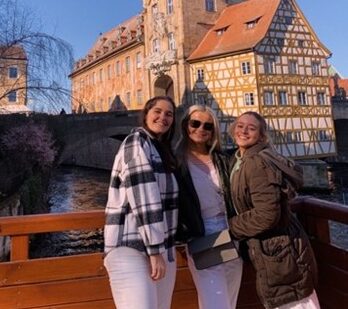

The Impact and Experience of Foreign Languages in the Context of Erasmus+ in all Education Sectors in Ireland
Dr Britta C. Jung
Posted: 9 June, 2020
Since its establishment in 1987, the Erasmus Programme has supported thousands of people across Ireland to widen their horizon by travelling to and living in another European country for a certain period of time. Following the opening of the programme first to staff members of Higher Education Institutions in 1997 and the subsequent merger of a number of mobility programmes in 2014 under the by now well-established Erasmus brand, Erasmus+ is today more open than it has ever been before. Indeed, it is difficult to encapsulate the breadth and diversity of experiences of the programme’s participants who hail from all education sectors, i.e. adult education, school, vocational education and training, and youth in addition to higher education. While the vast majority of Irish participants continues to be students from third-level institutions, taking part in Erasmus+ can also mean young people going on a week-long exchange in Portugal or Georgia with their school or youth project. It can mean an adult learner at a College of Further Education doing a placement in rural Finland or an administrator in a Research and Graduate School going to Armenia to explore a possible collaboration between the two institutions, and it can mean that a county council gets first-hand insights into the way a regional government in Germany attempts to integrate migrants and refugees.
While participants do not have to speak the language of the country they visit, it is clear that exposure to other languages and new language environments is an fundamental part of the Erasmus+ experience. After all, the programme’s goal is not only to boost work skills and allow for knowledge exchange, but also to promote common European values such as solidarity and inclusion, as well as to enhance active citizenship, civic engagement, and intercultural understanding. Languages play a key role in this context. Considering the breath and diversity of the participants of Erasmus+ it comes as no surprise that the experience of the foreign language and new language environment differs from participant to participant too. Generally speaking, the experience depends both on the form, length, and destination of the mobility as well as previous experiences with learning another language.
In 2018 the Higher Education Authority and Léargas charged me to conduct a comprehensive study which examines not only the impact and experience of foreign languages in the context of Erasmus+ but also the general attitudes towards language learning in Ireland. This is particularly important in the light of the government’s new strategy for foreign languages, Languages Connect, which has among its aims to “increase awareness of the importance of language learning to encourage the wider use of foreign languages.” Entitled The Impact and experience of foreign languages in the context of Erasmus+ in all education sectors in Ireland, the 120-page long study was officially launched on 28 May, 2020. It is based on more than 600 survey responses from former, current and future Erasmus+ participants, and 19 in-depth interviews with former participants and project co-ordinators. The interviewees came from a variety of organisations, spread across Ireland, and travelled to a wide range of countries.
One of the key findings of the study is the importance of the emotional dimension of language learning. While the vast majority of participants generally enjoy learning another language, the lack of learner agency and speaking opportunities is a common issue as is a lack of confidence in one’s own competencies as well as those of many teachers. As a result, many language learners in Ireland do not perceive themselves as a part of an ever-evolving language community in which learners use their whole linguistic repertoire by transferring knowledge from one language to another or simply switching between them. This is where Erasmus+ can play a significant role as it shifts the participants’ perception of other languages, language learning, and themselves as part of the process. On the one hand, the study points out that Erasmus+ mobilities “allow for and facilitate language learning and an engagement with other languages in more informal, unregulated settings, shifting the focus from an exam-based learning culture to a communicative one that allows learners to participate without the fear to fail, and to gain confidence.” On the other hand, four out of five survey respondents report an improvement in the local language where it was the main language of the mobility, with one in three also reporting an improvement in an additional language. If the mobility was conducted mainly through English, two out of five respondents noted a marked improvement. Additionally, many of the survey respondents and interviewees also highlight the positive impact on their English competences as well as their ‘communicative empathy’ when they interact with non-native English speakers or encounter any type of language barriers.
However, perhaps one of the most unexpected findings of the study is that the positive impact Erasmus+ can have on a participant’s attitude towards Irish. A case in point was a group of young Irish people on an exchange to Romania, who found themselves ‘embarrassed’ not to speak Irish. As the status of a language is often closely linked to questions of national identity, the Irish participants struggled to explain to their Romanian counterparts the complex relationship of the Irish to their national language:
“Then the subject of Irish came up. The Romanian group were asking why they don’t speak Irish, that’s your second language. But we were saying that’s not the case for most people. […] They were horrified. They were saying it’s your national language.
(…) I would say the Irish group got quite emotional, but at the same time, kind of let down because they couldn’t say, “Yeah, we do know this language,” or even the national anthem. It’s in Irish. The Romanians sang their national anthem, and we played it off YouTube, because we didn’t know. […] They felt quite embarrassed in terms of culture, so they said next time they’re learning the national anthem. So, that’s something that is really small and funny, but it had a huge effect on them. It’s a comparison of how you value culture and traditions, and the language of your country.”
The impact seems to be particularly strong in the context of mobilities to Central- and Eastern European countries that have also historically faced a state-sanctioned oppression of the national language as well as regions that are home to more than one language. Moreover, many participants are surprised how many people around the world are interested in the Irish language and the soft power it wields.
Overall, the participants’ experience of foreign languages, i.e. their embeddedness within culture as well as their interconnectedness with other languages, highlights that we need to consider the learning of another language not as an isolated, academic subject but as part of a complex learning process that includes the development of proficiencies that are shared across different languages, such as literacy, content learning, abstract thinking and problem-solving.
Last but not least, the study also underscores that although it may only be individuals that are travelling abroad, the participation can have a broader communal and societal impact. Not only does the study show that the likelihood to work in an international context or – indeed – to work in the country of mobility increases dramatically, the participation of a child in a school exchange may also result in the whole family considering travelling to non-English speaking countries. It may also create curiosity about the language and culture among peers, with the child passing on its newly gained intercultural skills and communicative empathy to family members and friends.
However, one of the most heartening impacts described by one of the interviewees, a teacher at a rural primary school, relates to the integrative effect she observed among her students and the shifting of (self-)perceptions. Having laid the groundwork and established the trust, the local Traveller community has in recent years become more and more open to letting their children participate in the school’s frequent exchange programme as well. This marks not only an important integrative experience for the rural community, but also for the children themselves. Participating in the exchange as part of the Irish delegation has allowed the children, for the first time, to see themselves in a different light, i.e. as people whose identity has different layers and who can simultaneously be members of the Traveller community as well as the Irish and European community.
If you are interested in the study and want to explore more of its findings, you can download the complete study here:

